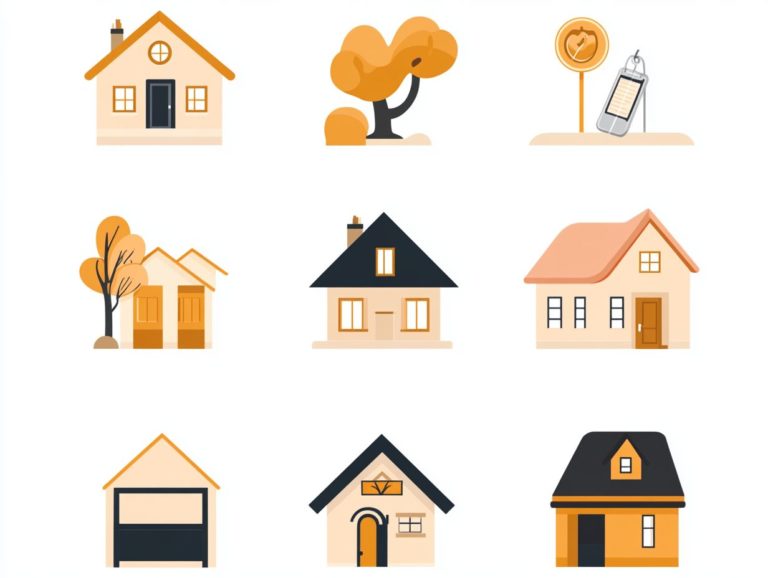7 Mistakes to Avoid When Buying Home Insurance
Home insurance can be overwhelming, but it doesn’t have to be! Navigating the realm of home insurance can indeed feel like a daunting task, but steering clear of common pitfalls can save you both money and unnecessary stress.
Many homeowners inadvertently make critical mistakes that may result in inadequate coverage or unexpected expenses later on. This article outlines seven essential mistakes to avoid when purchasing home insurance, ranging from grasping your coverage needs to exploring available discounts.
By the time you finish reading, you ll possess the insight needed to make informed choices and safeguard your home effectively.
Contents
- Key Takeaways:
- 1. Not Understanding the Coverage You Need
- 2. Not Shopping Around for Different Quotes
- 3. Not Checking for Exclusions and Limitations
- 4. Not Considering the Deductible Amount
- 5. Not Updating Your Policy Regularly
- 6. Not Asking About Discounts
- 7. Not Reading the Fine Print
- What Factors Should Be Considered When Choosing Home Insurance?
- What Are the Different Types of Coverage Available?
- How Can One Determine the Right Amount of Coverage?
- What Are Some Common Exclusions and Limitations to Look Out For?
- How Can One Save Money on Home Insurance?
- What Are the Consequences of Not Having Adequate Home Insurance?
- What Are Some Important Clauses to Look for in a Home Insurance Policy?
- What Should Be Done in Case of a Claim?
- Frequently Asked Questions
Key Takeaways:

Understand the coverage you need and don’t rely on a one-size-fits-all policy. Before making a decision, consider what to know before buying home insurance, shop around for different quotes, and compare coverage and prices. Check for exclusions and limitations to avoid unexpected gaps in coverage.
1. Not Understanding the Coverage You Need
Understanding the specific coverage you need for your homeowners insurance policy is essential for safeguarding your investment and ensuring financial security. You must consider factors such as your personal belongings and potential property damage.
Assessing the liabilities that could arise from unforeseen events is also important. A thorough evaluation of your personal belongings is crucial; this process allows you to pinpoint valuable items that may need additional coverage beyond standard limits.
It’s vital to assess the risks associated with property damage, which can fluctuate based on your location, weather patterns, and neighborhood crime rates. By systematically categorizing your possessions and recognizing potential hazards, you can clearly communicate your needs to insurance providers.
This heightened awareness gives you the power to utilize tailored options in your insurance policies. Ultimately, this builds the sense of security every homeowner deserves.
2. Not Shopping Around for Different Quotes
Failing to shop around for different quotes can mean you miss out on better rates and coverage options. To ensure you’re making the best choice, consider how to avoid common home insurance mistakes, as this is crucial for optimizing your homeowners insurance investment.
By taking the time to compare policies, you can uncover tailored coverage that fits your specific needs. Researching various insurance companies gives you the power to find competitive prices, leading to significant savings.
Even small differences in premiums can add up over time, making thorough research a wise decision for any homeowner. This proactive approach not only helps you secure a financially smarter policy but also enhances your peace of mind.
3. Not Checking for Exclusions and Limitations
Not taking the time to examine the exclusions and limitations of homeowners policies can leave you exposed to unexpected financial burdens when it comes time to file a claim. To avoid this, consider these 8 questions to ask before buying home insurance, as common exclusions, like flood and earthquake coverage, can dramatically affect your claims process.
You might find, to your surprise, that your standard policy fails to cover damages from events that are all too familiar in your area. Being aware of these exclusions gives you the power to explore additional coverage options.
Understanding these details is vital, as it equips you to navigate the often intricate landscape of insurance while ensuring you secure comprehensive protection for your property. This understanding helps you make informed decisions when selecting a plan.
4. Not Considering the Deductible Amount
Overlooking the deductible amount when choosing a homeowners insurance policy can greatly affect your premiums and out-of-pocket costs when you file a claim. It s important to evaluate your options carefully.
A deductible is the amount you must pay before your insurance kicks in. Generally, policies with higher deductibles have lower premiums, leading to initial savings.
However, this can result in big expenses if you file a claim for significant damages. Choosing a lower deductible can ease financial pressure during a claim, but it often comes with higher monthly payments.
Finding the right balance is key. This helps ensure you have adequate coverage without overwhelming financial burdens when unexpected events occur.
5. Not Updating Your Policy Regularly
Failing to update your homeowners insurance policy can lead to inadequate coverage, especially after major changes like renovations or new family members. To better navigate this, consider these 7 tips for understanding home insurance jargon. Regular evaluations are crucial.
Life changes constantly, whether it’s welcoming a family member or improving your property. Regularly reviewing your policy ensures your coverage reflects these changes and protects you from potential losses.
By actively assessing your insurance needs, you can avoid financial pitfalls and secure the peace of mind you deserve. This not only helps identify gaps in coverage but also opens the door to potential discounts or better protection options.
6. Not Asking About Discounts

Many homeowners miss the chance to ask their insurance agents about discounts, which can lower their premiums and make insurance more affordable. Discounts may be available for security features like alarm systems and surveillance cameras.
These enhancements not only protect your property but also lead to significant savings. Bundling your homeowners and auto insurance can also offer considerable discounts since many insurers reward customers for consolidating their policies.
By staying in touch with your insurance agent, you can discover various savings opportunities that might otherwise be overlooked. Make sure to get the most out of your coverage while keeping costs manageable.
7. Not Reading the Fine Print
Ignoring the fine print in an insurance policy can lead to misunderstandings about coverage, claims processes, and exclusions. This can leave you unprepared for unexpected events.
Many people discover too late that their policies have important details about deductibles, coverage limits, and exclusions that are easy to overlook. These details often outline the conditions for making claims, and not understanding them can lead to denied claims when you need help.
Overlooking terms like waiting periods can have serious consequences, putting your financial security at risk. Taking the time to review every aspect of your insurance contract is essential for protecting your investment and being ready for whatever life throws your way.
What Factors Should Be Considered When Choosing Home Insurance?
When selecting homeowners insurance, you need to consider several key factors. These include your specific insurance needs, the market value of your home, and the appropriate coverage amounts necessary to protect against property damage and liabilities. For assistance with the claims process, check out these 7 tips for filing an efficient home insurance claim.
It’s also crucial to assess your location. Some areas are more prone to natural disasters like floods or earthquakes, which may require specialized coverage tailored to those risks.
The type of dwelling you own such as a single-family home, condo, or townhouse can greatly influence both your insurance premiums and the options available to you.
Don t miss out on protecting your valuables! Pay special attention to your personal belongings, especially high-value items like jewelry or collectibles, as these may need extra provisions in your policy.
To evaluate your insurance needs effectively, take the time to create a detailed inventory of your possessions. Consulting with an insurance professional can also ensure that you secure the right coverage tailored to your unique circumstances.
What Are the Different Types of Coverage Available?
Homeowners insurance offers a variety of coverage types, from basic dwelling protection and liability coverage to additional options like endorsements, which are special additions to your policy for unique needs.
For instance, dwelling coverage acts as a safety net against damages to your home from fire, storms, or vandalism. Liability coverage is your financial shield in case someone gets injured on your property. Endorsements can enhance your protection, covering unique situations such as home-based businesses or valuable possessions.
To select the most suitable options, assess your individual circumstances. Consider factors like your location, property value, and personal assets to ensure you have tailored protection that meets your needs.
How Can One Determine the Right Amount of Coverage?
Determining the right amount of homeowners insurance coverage requires careful evaluation of your home’s market value and its replacement value.
Start by conducting a thorough home inventory to account for all your personal belongings and assets. Gather all relevant documentation related to your property, such as recent appraisals and real estate listings, to establish a reliable baseline for your market value.
Create a detailed inventory of the items in your home. Catalog your valuable possessions, along with receipts or photographs that can serve as proof during claims.
Regular check-ups on your policy ensure you’re covered for everything. Evaluating your insurance policy every few years is essential, as changes in property value and personal circumstances can greatly impact your coverage needs.
Engaging with an insurance agent can provide you with valuable insights into any potential gaps in your coverage, ensuring you are adequately protected.
What Are Some Common Exclusions and Limitations to Look Out For?
Common exclusions and limitations in homeowners insurance policies can include specific risks, such as flood insurance and earthquake coverage. Understanding these factors is important, as highlighted in the 7 unexpected benefits of home insurance, to avoid potential financial pitfalls.
Staying informed can save you from unpleasant surprises when disaster strikes, as standard policies often don t cover damages from natural calamities like overflowing rivers or seismic activities.
You might also unintentionally overlook exclusions related to personal property, theft, or certain types of liability claims, all of which could significantly impact your financial security.
By understanding these restrictions, you position yourself to seek additional coverage options, such as purchasing separate flood insurance or riders for high-value items, ensuring a more comprehensive safety net for your investments.
How Can One Save Money on Home Insurance?

You can save money on homeowners insurance through several smart strategies, such as leveraging available discounts, comparing insurance rates, and opting for higher deductibles the amount you pay before insurance kicks in to bring down your premiums.
By taking proactive steps, you can significantly reduce your overall insurance costs while still ensuring you have adequate coverage. Regularly reviewing and updating your home safety measures is wise. Enhancements like installing smoke detectors and security systems can often lead to lower premiums.
Maintaining an emergency fund offers a financial cushion for unexpected expenses. This allows you to comfortably choose higher deductibles without the worry of steep out-of-pocket costs.
Bundling your various insurance policies, like auto and home, can yield substantial discounts. This approach crafts a more comprehensive financial strategy that promotes significant long-term savings.
What Are the Consequences of Not Having Adequate Home Insurance?
Not having adequate homeowners insurance can lead to severe financial repercussions, particularly when faced with property damage or homeowner claims. To avoid pitfalls, it’s crucial to be aware of common mistakes when filing home insurance claims. This oversight can leave you vulnerable to unexpected expenses and liabilities.
Imagine a sudden fire breaking out in your home. It could destroy everything, and without enough coverage, you d face hefty repair bills.
If someone gets injured on your property and your insurance falls short, you might be stuck with overwhelming medical bills and potential lawsuits. These scenarios highlight the importance of understanding the financial implications of your insurance policies.
Having adequate coverage brings you peace of mind and safeguards your hard-earned assets against unforeseen disasters.
What Are Some Important Clauses to Look for in a Home Insurance Policy?
When you’re reviewing a home insurance policy, it s crucial to focus on the key clauses that influence the claims process, coverage amounts, and any exclusions situations or damages that your insurance does not cover that might affect your overall protection.
Understanding how these clauses operate is essential for you as a homeowner. They can greatly impact both the level of protection you receive and the simplicity of submitting claims.
Specific terms regarding deductibles can lead to significant out-of-pocket expenses during the claims process. Limitations on certain types of damage might take you by surprise when disaster strikes.
Being aware of any time frames for reporting claims and the necessity for regular policy updates enables you to maximize your coverage. This ensures that you are well-protected against unforeseen events.
What Should Be Done in Case of a Claim?
Understanding the claims process is crucial. Act quickly to ensure you protect your interests. This typically entails reaching out to your insurance company, collaborating with your insurance agent, and supplying the necessary documentation for evaluations.
To kick off this journey, begin by reviewing your policy to familiarize yourself with the specifics of your coverage and any exclusions. This foundational understanding gives you the power to communicate your concerns and expectations effectively during discussions.
After making initial contact, it s crucial to document all property damage with photographs and videos, creating a clear record of the extent of the loss. Maintaining consistent and timely communication with the insurance adjuster can significantly impact the speed of resolution, so be sure to keep a log of all interactions.
Regular follow-ups and a proactive approach often pave the way for a smoother claims experience.
Frequently Asked Questions
What are the 7 mistakes to avoid when buying home insurance?
- Not researching different insurance providers
- Underestimating the value of your home
- Not understanding your coverage
- Not reviewing your policy regularly
- Not considering additional coverage options
- Not bundling policies
- Not reading the fine print
Why Researching Different Insurance Providers Matters

Researching different insurance providers can save you money and improve your coverage. By comparing quotes, you can find the best deal tailored to your needs.
Understand Your Home’s Value
Underestimating your home’s value can lead to being underinsured if disaster strikes. Always ensure your coverage matches your home’s current market value by understanding the key facts about home insurance coverage.
Know Your Coverage
Understanding your coverage is crucial. This knowledge prevents confusion and frustration during the claims process.
Review Your Policy Regularly
Your coverage needs can change over time. Review your policy annually to make sure you have the right amount of coverage.
Consider Additional Coverage Options
Not considering extra coverage can expose you to risks. Depending on your location, you might need coverage for natural disasters or valuable belongings.
Read the Fine Print
Reading the fine print is essential to avoid surprises when filing a claim. Carefully review your policy for any exclusions and limitations.





